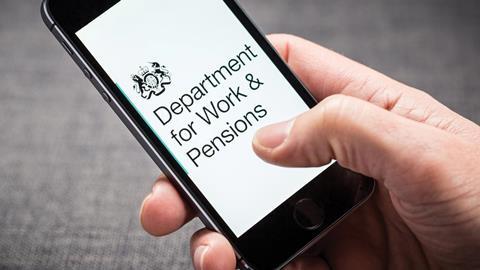MPs from the Commons Justice Committee are worried that reforms to the courts and tribunals may have implications for access to justice. An inquiry announced this month will consider whether online processes and video hearings can be a ‘sufficient substitute’ for access to the court and tribunal buildings that are currently being closed.

What MPs do not seem to have considered is that online reforms to be piloted this spring may provide litigants with a better service than they receive by turning up at a tribunal.
The reforms that were made widely available last year – in areas such as divorce, probate and civil money claims – involved digitising and enhancing existing processes. But some dissatisfied social security claimants will soon be offered an entirely new route to justice.
People who need help with daily activities because of a long-term illness or disability may now claim a recurring personal independence payment from the Department for Work and Pensions (DWP). Those who are turned down after a reconsideration may appeal to the Social Security and Child Support Tribunal. That appeal can already be launched online and around 3,300 have been lodged since last July. Although some appeals may be decided on the papers, most now go to an oral hearing followed by a written decision.
Though tribunal members try to put users at ease, most appellants find the prospect of an oral hearing intimidating. They have to turn up in person and wait for their appeal to be called on. The hearing may be over in moments if they have the doctor’s letter that the tribunal had requested. Or it may be inconclusive if the appellant does not have the necessary information readily available.
What is now planned is a form of early neutral evaluation. Tribunal members will assess each appeal and consider whether further evidence is needed. That can be posted or uploaded using a mobile phone.
Next, the tribunal will issue a reasoned view of the case. The appellant can then accept or reject it – as can the DWP. Either party can still insist on an oral hearing, but this is likely to be rare. Around two-thirds of the appeals in personal independence payment cases are currently successful, mainly because appellants clarify their evidence (‘when I said I played football regularly, I meant table football’).
This appeal process will be piloted using real appellants in the coming weeks. But the next stage, planned for later this year, is even more innovative.
Judge John Aitken, president of the social entitlement chamber of the First-Tier Tribunal, refers to it as a ‘forum’ – though others will recognise it as a glorified WhatsApp group. Submissions and documents can be posted on the case file by the appellant and the DWP. Tribunal members can ask questions online. Unlike an oral hearing, the parties and tribunal members will not need to be in the same place. Unlike a video hearing, they will not need to take part at the same time.
Continuous online resolution, as it is called, has huge advantages. The appellant has enough time to look up the details needed by the tribunal and – perhaps with the help of a relative or friend – upload them from home in the evening. A DWP official, who would not normally trouble to attend the hearing, will see those details at work the next morning. Once that information has been considered, the DWP may concede the appeal. If not, officials will soon learn how much weight the tribunal attaches to evidence and arguments of this nature.
This system is highly attractive to the tribunal members, many of whom sit part-time. A medically qualified member could log-on from home over the weekend and assess the evidence uploaded in a batch of cases. Each written comment on the case – whether made by the parties or by the tribunal – will be saved like an email trail. It will be invaluable in the event of an appeal. The record should also be available for inspection by press and public.
One flaw in the current system is that every page on the courts and tribunals website is headed ‘gov.uk’. In the Gresham lectures I delivered in 2017 and 2018, I argued that this was inappropriate for claims against the government. I expect to report a minor victory at my final lecture on 21 February.
Oral hearings have been at the heart of our justice system for centuries. Of course, they remain essential in criminal trials and some other contested cases. And people who needed help to apply online for benefits will need help to appeal. But the experience of the civil resolution tribunal in British Columbia and the traffic penalty tribunal for England and Wales is that most users simply want their problem resolved. If that can be done without leaving home, so much the better.
joshua@rozenberg.net




























No comments yet